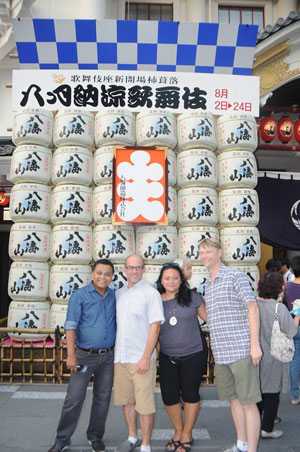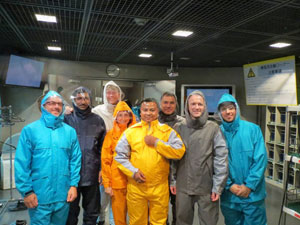

 My Summer in Urawa
My Summer in Urawa
University of Wyoming
Laramie, Wyoming
From July 9th, 2013 through Aug. 23rd, I was fortunate to participate in the Japan Foundation’s summer language program for non-native teachers of Japanese. The fact that there even is such a program attests to the wide reach and sincere effort of the Japan Foundation to maintain the highest standards of Japanese language education. Before I left Wyoming, I expected to receive instruction in classroom methodology, teaching materials, and pedagogical theory- I did. However, the surprising part of my summer had less to do with education, and more to do with the international atmosphere that is nurtured in Urawa.
On my way from Narita, I was on a bus with other participants who were also arriving at the center; one was from Thailand, the other from Iran. After acquainting ourselves, I realized that Japanese was our common language, even though both my new friends spoke some English, it was not the common language among the 50 participants. In truth, I should not have been surprised. The participants came from a wide range of countries: Iran, Malaysia, Indonesia, Taiwan, Uzbekistan, Russia, Kyrgyzstan, Ukraine, France, Holland, Germany, Canada, India, and on and on. In the café, when we went out, we spoke to each other in Japanese.
The range of customs and skill levels among the participants was also very exciting. Many were fasting for Ramadan, and these humble souls would stay up till three in the morning to get a bit of nourishment for the next day’s lessons. Many drank no alcohol, many drank often. Food requirements and tastes varied. A few of the participants had lived in Japan for extended periods and had natural speaking ability. Several had never been to Japan. Our classes, too, were divided by skill level, and this was measured quite precisely by a series of tests we encountered on our first full day in Japan. Teachers are not used to taking tests, but we submitted ourselves and our knowledge to the scrutiny of our hosts. For me, the test was quite difficult.
Another interesting discovery surfaced very early and that was: the institutions of employment for each person also varied greatly. People taught Japanese at every level, high school level, colleges, and a few taught at middle school or below. Some of the colleges were state institutions, others were private language schools. Nevertheless, considering the wide economic and social differences of our mother countries, by the type of clothing and luggage we carried, we all appeared to be receiving similarly modest salaries.
Soon after our placement test, we were divided into groups and our daily lessons began. In addition to the formal elements of teaching, we were also instructed in history, software, research methods, and web surfing. We did presentations on teaching, we wrote lesson plans, and we improved our listening skills. Our instructors were experienced and kind and they informed us very early on that, though our language level may be low and embarrassingly unsophisticated, we were all teachers and therefore we would treat each other as equals.
 Part of our culture lessons included trips to Tokyo to see interesting sites. We saw a Kabuki play; we participated in flower arranging, tea ceremony, and several local festivals. To understand Japan’s geology, we experienced a hurricane, a fire, and an earthquake at the Emergency Response Center. Most participants did a home-stay visit with a Japanese family, others, like myself, took the time to explore parts of Japan we had never seen. I climbed Mount Fuji.
Part of our culture lessons included trips to Tokyo to see interesting sites. We saw a Kabuki play; we participated in flower arranging, tea ceremony, and several local festivals. To understand Japan’s geology, we experienced a hurricane, a fire, and an earthquake at the Emergency Response Center. Most participants did a home-stay visit with a Japanese family, others, like myself, took the time to explore parts of Japan we had never seen. I climbed Mount Fuji.
The Language Institute is in Kita-Urawa, not the most exciting place in Japan, but only 30 minutes to Tokyo, and isolated enough to keep us focused on our studies. The center is equipped with dorm-style rooms- a single bed, a desk, TV, internet, and bath. Our meals were provided for and eaten in common in the institute’s dining hall. All of our needs were provided for by the gracious and instructive staff and faculty, who often went out of their way to smooth our way. For instance, my luggage did not arrive with me, but the staff contacted the airport, helped me find a clothing store, and showed concern and pity for the white tee-shirt that I wore for the first three days.
By the end of the program, I felt ready to return to my duties at the University of Wyoming, with a renewed enthusiasm and a few more tricks up my educational shirt-sleeve. The fundamental point of the program is to encourage teachers to be inventive and creative, to inspire students, and to give them an appreciation for the Japanese language and people, so that they will hold Japan closer to their hearts. In this, the program is a success. At the same time, the sense of community among the teachers, and the exposure of each participant to the knowledge that the Japanese language exists even in the far reaches of the world, was for me, even more inspiring.